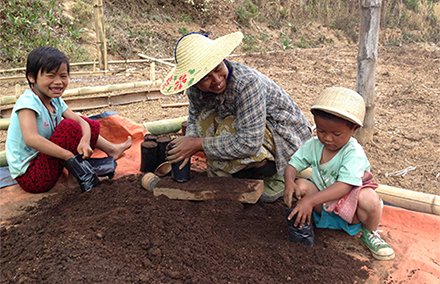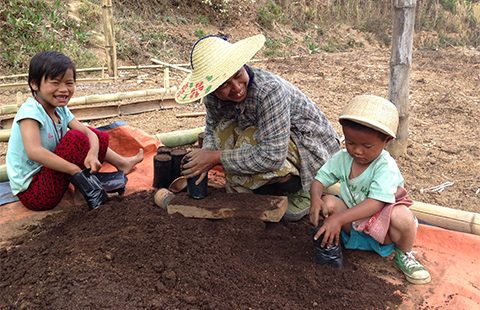
Local farmers in Shan state pack coffee into seed bags. Photo: Charlie Artingstoll.
Alternative crops can help stop Myanmar’s opium trade and lift up desperately poor farmers in need.
Thura Ye* and his family live in the village of Taungyyi, deep in Myanmar’s opium-producing Golden Triangle region. Despite only being four years old, he’s helping his mother prepare seed bags.
Thura Ye is lucky; he and his family are one of 600 families involved in alternative development projects in the hills around his home.
As a result, and unlike children in nearby villages, the seed bags he is helping with contain coffee seeds rather than poppy seeds, offering him another choice to the life of ‘crime’ and poverty to which other children in the area will succumb.
Alternative development projects offer farmers alternative crops to poppy – mainly coffee – which avoid the risk of machete-wielding officials eradicating their annual income, or the payment of bribes to non-descript ‘men with guns’.
Farmers are so eager to avoid the associated problems of poppy cultivation that they go to considerable lengths to get involved in projects which are heavily oversubscribed and underfunded.
On a recent visit to a nearby village I saw a sign designating a tapioca field. Unfamiliar with the plant, I asked the farmer what is was, and was stunned to discover that he had no idea either. Replacing poppy with a plant that the farmer was not only unfamiliar with, but had never seen before goes to show just how far they are willing to go.
Farming families like Thura Ye’s grow poppy because in their remote villages, it’s the only thing they can sell. As a recent Transnational Institute report stated, for many, the decision to grow poppy is ‘not of profit maximisation, but a coping mechanism’.
Alternative development focuses on this poverty. The idea behind it is that once farmers have access to economically viable alternative crops – coffee is more valuable at the farm gate than opium – they will switch production and opiate production will stop.
However, alternative development is not a panacea for the drug problem in Myanmar. The bigger picture is that even if these projects are successful in converting poppy farmers into alternative crops – as happened in Thailand in the 1980s – poppy cultivation will simply shift to another region via what is known as the ‘Balloon Effect’.
This sees the reduction in drug production in one region overshadowed globally by subsequent increases elsewhere, just as squeezing one end of a balloon will cause the other end to expand.
The global drugs market is incredibly complex, resilient and powerful. The only drug wars that were ‘successful’ were in Maoist China in the early 1950s and in Taliban controlled Afghanistan in 2001 before the ISAF invasion, where draconian penalties such as mass incarcerations and executions were ruthlessly enforced on producers and users alike.
The United States, the United Nations and the Association of Southeast Asian Nations (ASEAN) have been trying to “eliminate or significantly reduce narcotics” drugs for decades.
A string of ludicrous goals aimed at global drug eradication in 1998 (US), 2008 (UN) and 2015 (ASEAN) were not met.
They failed then and they will fail in 2019 (UN) or 2020 (ASEAN) when the extended eradication targets are set, unless the incomprehensibly harsh policies above are employed. When viewed in the context of these absurd goals, alternative development is about as useful a tool in the war on drugs as a pair of chopsticks is for eating soup.
That’s not the point though – when viewed in terms of development, these projects give farmers an alternative to crime and poverty, and is therefore an extremely useful tool in improving the lives of a seriously impoverished, desperate and often over-looked group.
A global drug policy which criminalises farmers and their families who have no alternatives for generating income clearly needs to be rethought. The UN General Assembly Special Session on Drugs next year would be a good place to start.
In the meantime alternative development programs like the one that save Thura Ye and his family from a life of crime, despite having a negligible effect global drug goals, ought to be expanded.
Charlie Artingstoll is a graduate of Cambridge University and has just finished working at the United Nations Office on Drugs and Crime in Myanmar.
This article is the second in a three-part series on tackling Myanmar’s opium trade. Read the first article here and the third article tomorrow.
* Not his real name
 Facebook
Facebook  Twitter
Twitter  Soundcloud
Soundcloud  Youtube
Youtube  Rss
Rss 